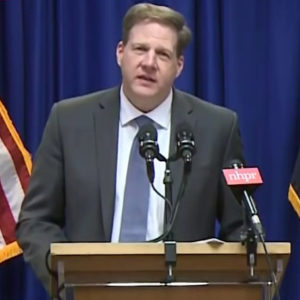For months, tens of thousands of Granite Staters have been paying Massachusetts income taxes on the work they’ve done in New Hampshire. And they’ve done so with few objections from Gov. Chris Sununu on their behalf.
Until now.
On Friday, Gov. Sununu released two letters that will be presented at a Massachusetts Department of Revenue (DOR) public hearing next Thursday, “vigorously objecting” to the new tax policy and urging the state to rescind it to “avoid significant legal concerns.”
One letter is from Attorney General Gordon MacDonald, the other from Taylor Caswell, Commissioner of the New Hampshire Department of Business and Economic Affairs. Both object to Massachusetts’ new commuter-tax policy in part because it undermines New Hampshire’s decision to reject an income tax.
In his cover letter to Massachusetts Gov. Charlie Baker, a fellow Republican, Sununu says their comments “are being offered at my direction and articulate our serious policy and legal concerns.”
“It is my hope that this matter can be resolved promptly and in a manner that removes any necessity for New Hampshire to consider legal remedies,” Sununu concludes.
New Hampshire commuters paying Massachusetts income taxes on work they do across the border isn’t new or controversial. About 84,000 Granite Staters regularly cross the state line for work — or did until the COVID-19 pandemic. In March, Baker began ordering businesses in his state to close and, by April, thousands of former commuters were forced by state fiat to work from home.
Rather than apply the standard rule–that work done outside Massachusetts isn’t subject to its income tax–the Massachusetts DOR declared that anyone who worked in the Bay State before the lockdown would be taxed as though they were still commuting. It’s called the Emergency Income Tax Rule.
Prominent tax attorney George Isaacson, who appeared before the US Supreme Court in the Wayfair interstate sales tax case, tells NHJournal “the Massachusetts Department of Revenue has a long history of reaching across its borders to tax companies and individuals that are not physically present in the Commonwealth. The latest effort is a tax grab using the current pandemic as the pretext.”
“It seems both cynical and overreaching for a state to exploit a health crisis to impose income tax liability on persons whose work outside the state is the result of the state’s own emergency order,” Isaacson added.
In his letter, AG MacDonald writes:
“Under the Emergency Income Tax Rule, an individual who has chosen to reside in New Hampshire and who works exclusively within New Hampshire may nonetheless be subject to an individual income tax imposed extraterritorially by a separate sovereign. This is incompatible with New Hampshire’s unique sovereign policy choices. It also raises several significant legal concerns.”
Among them, according to MacDonald, are the fact that the rule is confusing and overly broad and appears to conflict with Massachusetts state law regarding how income taxes are applied. MacDonald also says the policy raises constitutional issues under the Due Process Clause and the Commerce Clause, and violates the sovereignty of the state of New Hampshire.
And, like Isaacson, MacDonald notes what appears to be a cynical decision to tax Granite Staters for doing the right thing, pointing out it’s a “tax on individuals who are doing their civic duty to protect the broader public health at a time when they can least afford an unexpected new cost.”
“I request…that the Massachusetts Department of Revenue rescind or modify the proposed Emergency Income Tax Rule,” the Attorney General writes. “This course of action would avoid the significant legal concerns identified above.”
Thus far, Massachusetts has shrugged off objections to its new policy, simply saying the goal is to avoid disruptions for businesses and is scheduled to end January 1, 2021, anyway. But some New Hampshire critics worry that, once the precedent is set, there’s no reason Granite State workers should trust Massachusetts not to exploit them again.
“The Massachusetts Department of Revenue has a long history of reaching across its borders to tax companies and individuals that are not physically present in the Commonwealth,” Isaacson said.
Republican candidate for NH Executive Council Bob Clegg says New Hampshire must act.
“If Governor Baker doesn’t back off of this half-baked scheme, when I am in the Executive Council, I will vote against every single state contract offered to companies based out of Massachusetts,” Clegg said. “I will make sure that not one, single dollar of New Hampshire’s tax revenue is spent in the Bay State.
“Massachusetts has no business sticking their hands into the wallets of New Hampshire residents that live and work in New Hampshire. The liberals in Massachusetts are trying to pick the pockets of hardworking New Hampshire residents and force their irresponsible taxes on our state,” Clegg said.
Some critics describe Sununu’s response to Massachusetts’ overreach as muted. He rarely speaks on the issue publicly (though passionately during an August 10 appearance on CNBC), despite his vigorous fight against income tax proposals within his own state.
As for sending letters, one of his would-be opponents, Democratic state Sen. Dan Feltes has done as much. “Senator D’Alessandro and I sent our letter on August 5,” he told NHJournal. “This change in tax law is anti-worker, anti-public health, and needs to be rescinded. If Massachusetts doesn’t withdraw this tax rule change, Gov. Sununu should file a lawsuit in federal court to protect Granite Staters and the New Hampshire advantage.”
Previous governors like Mel Thomson made a career out of confronting Massachusetts’ meddling across the state line. Why such a tempered response from Sununu?
“I completely reject the idea that my response as been muted,” Sununu told NHJournal. “I called Charlie Baker directly. It’s a fairly complicated legal issue. It isn’t just ‘send a letter, get your money back.’”
“There’s not a day that goes by that we aren’t talking about it. The Attorney General’s office has an entire team working on this issue.”

